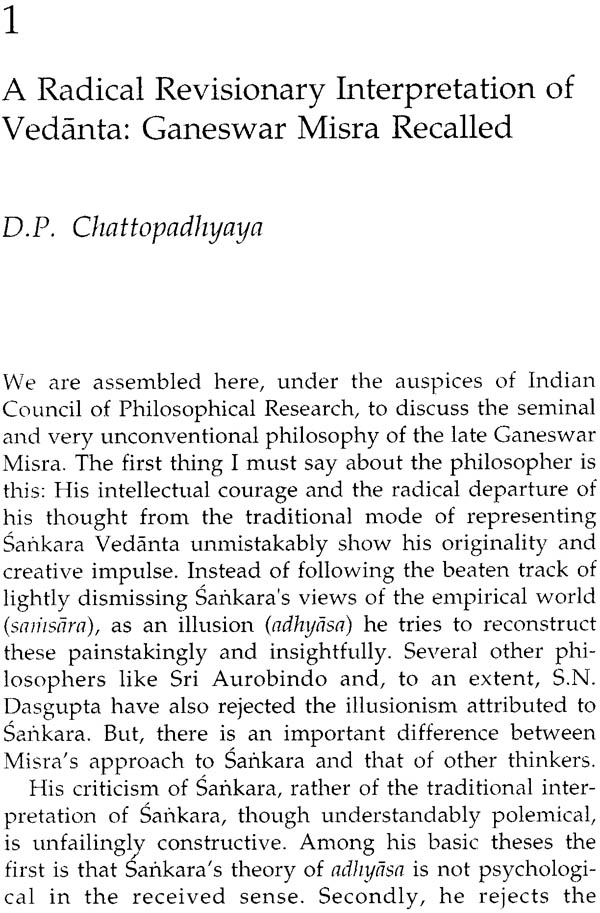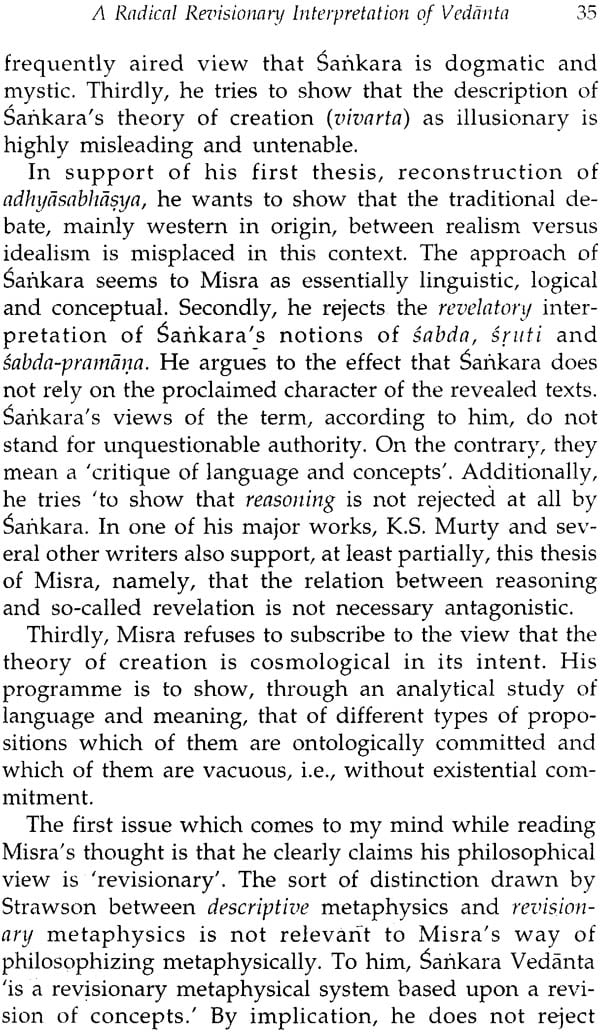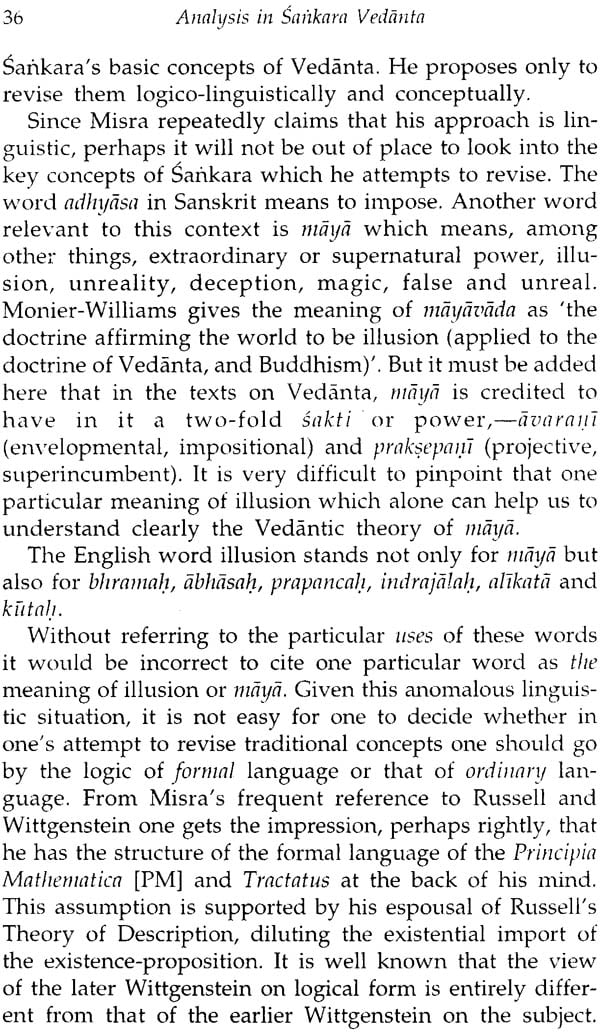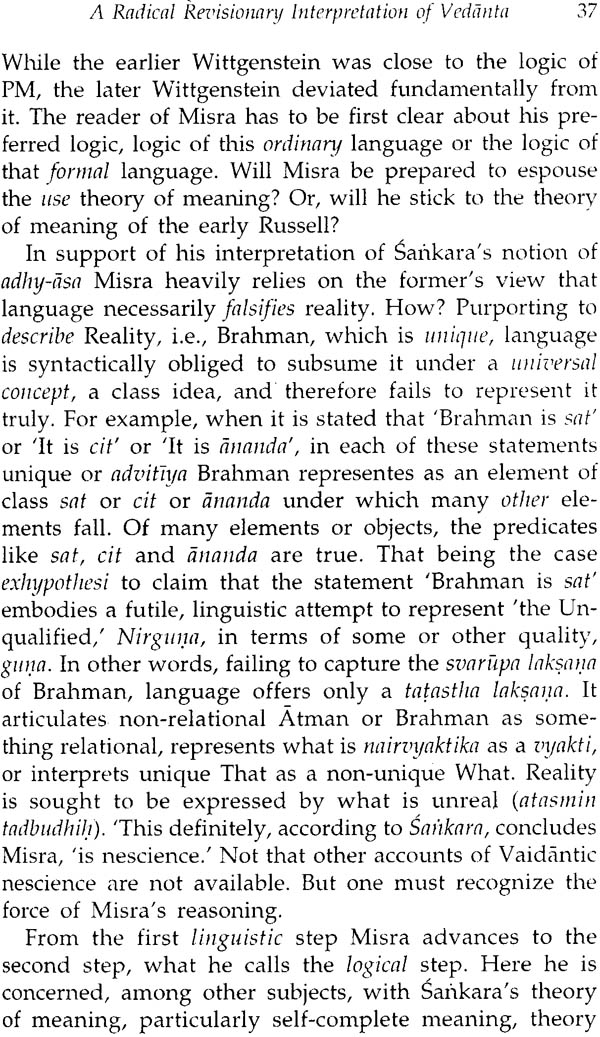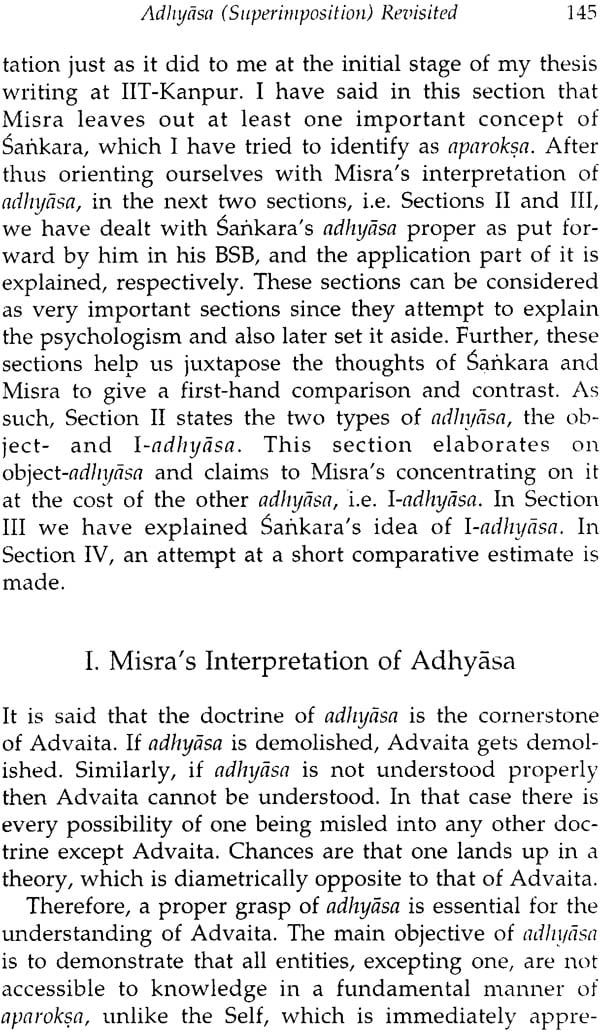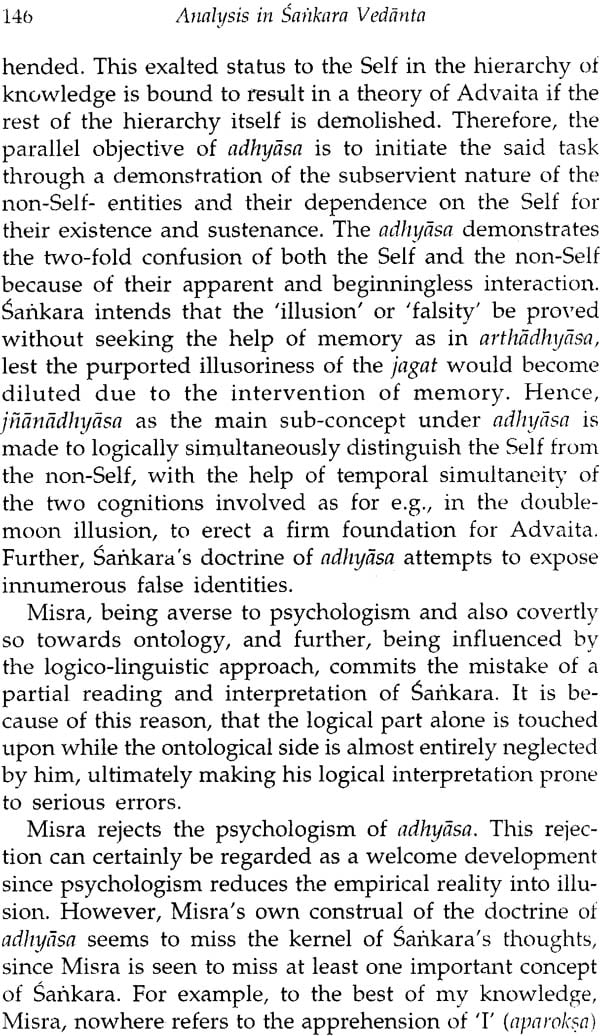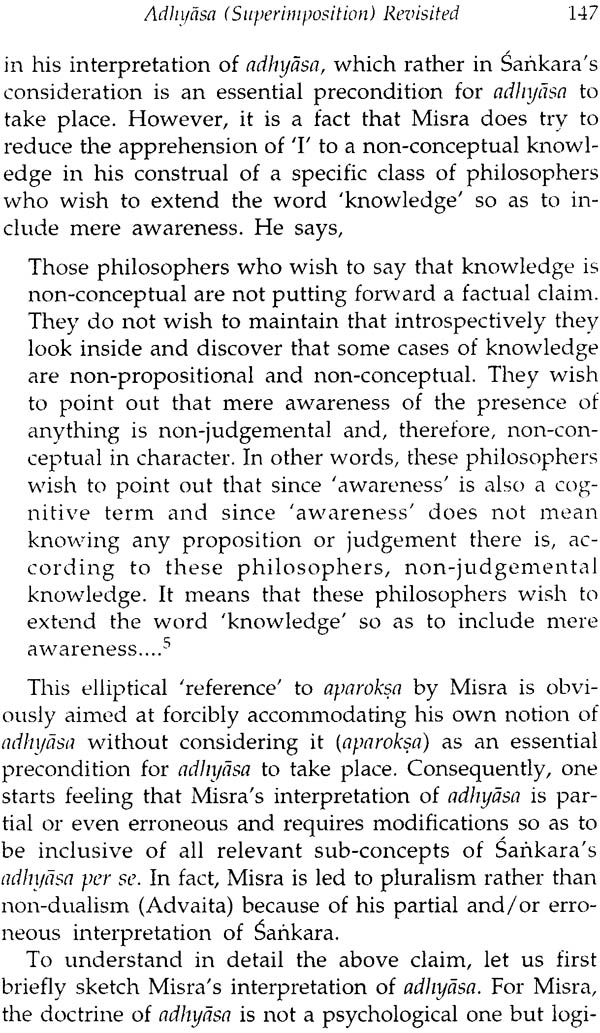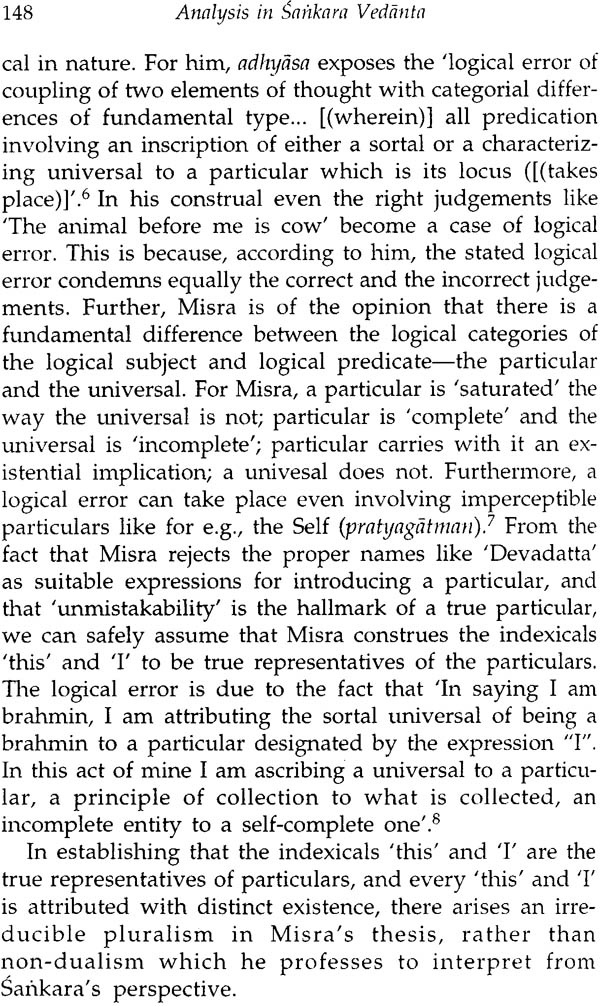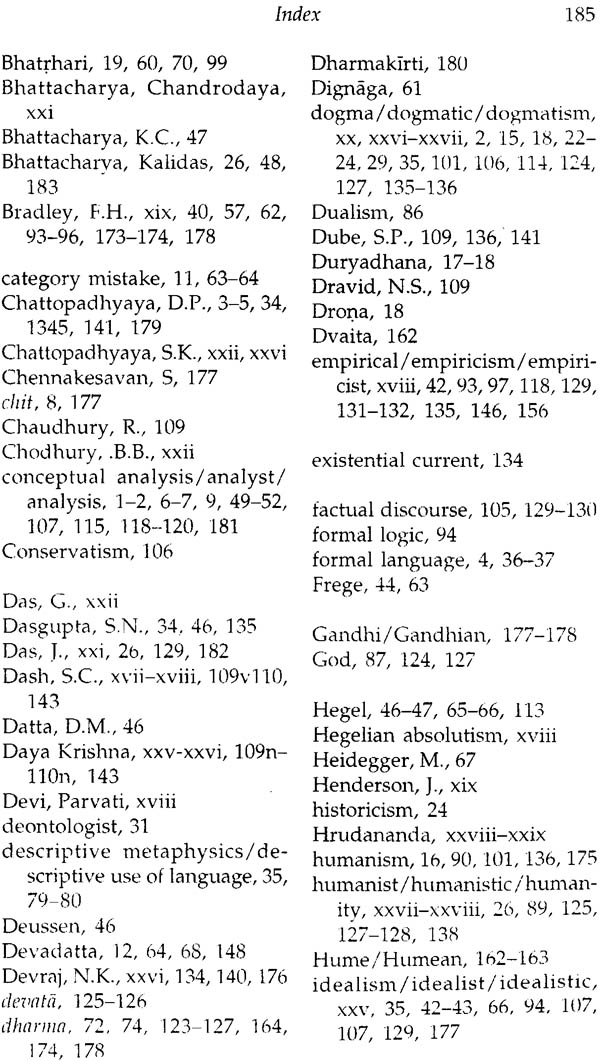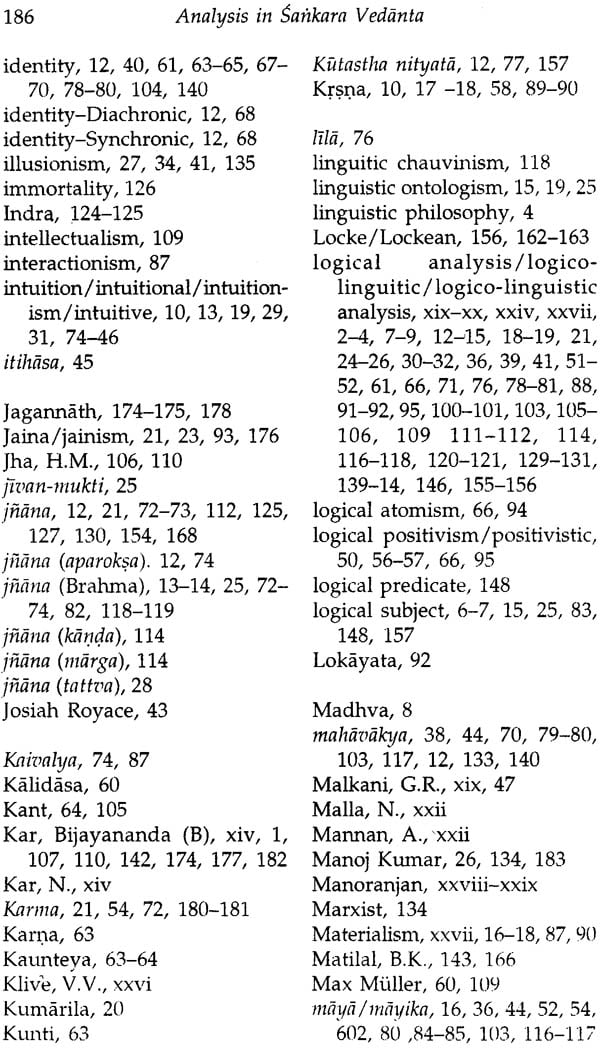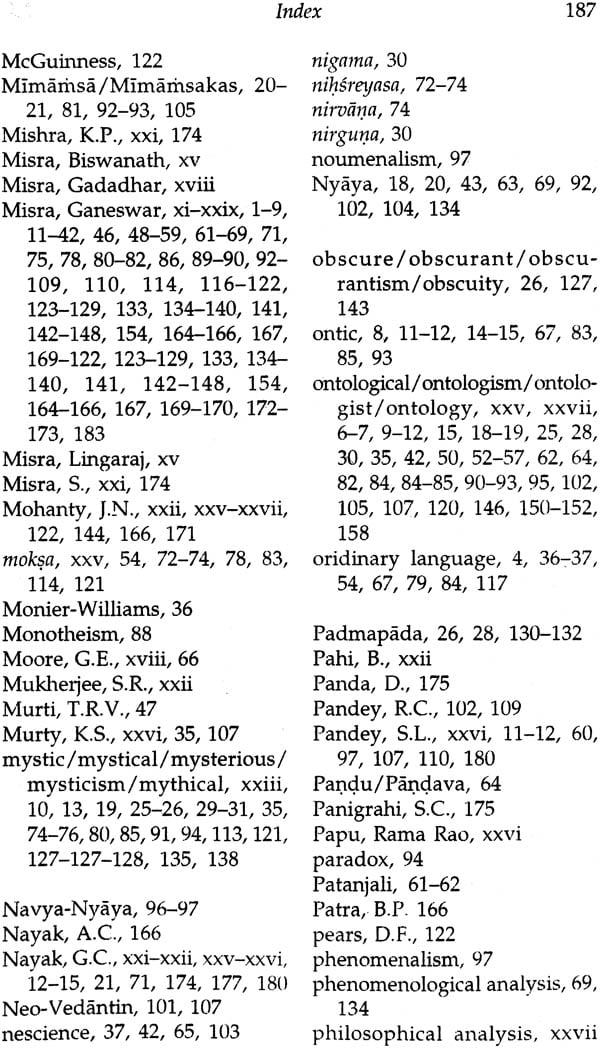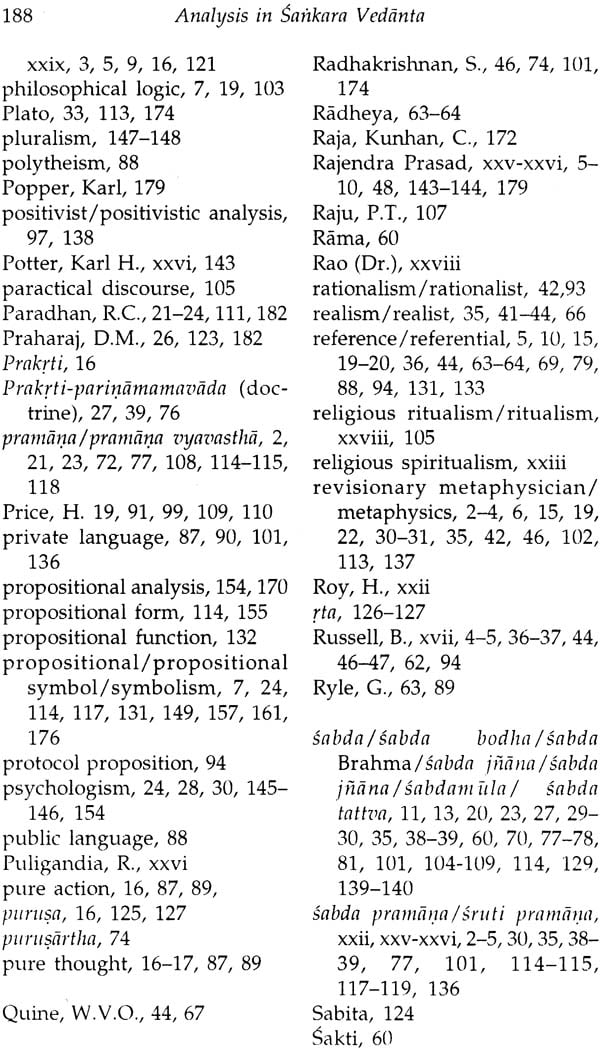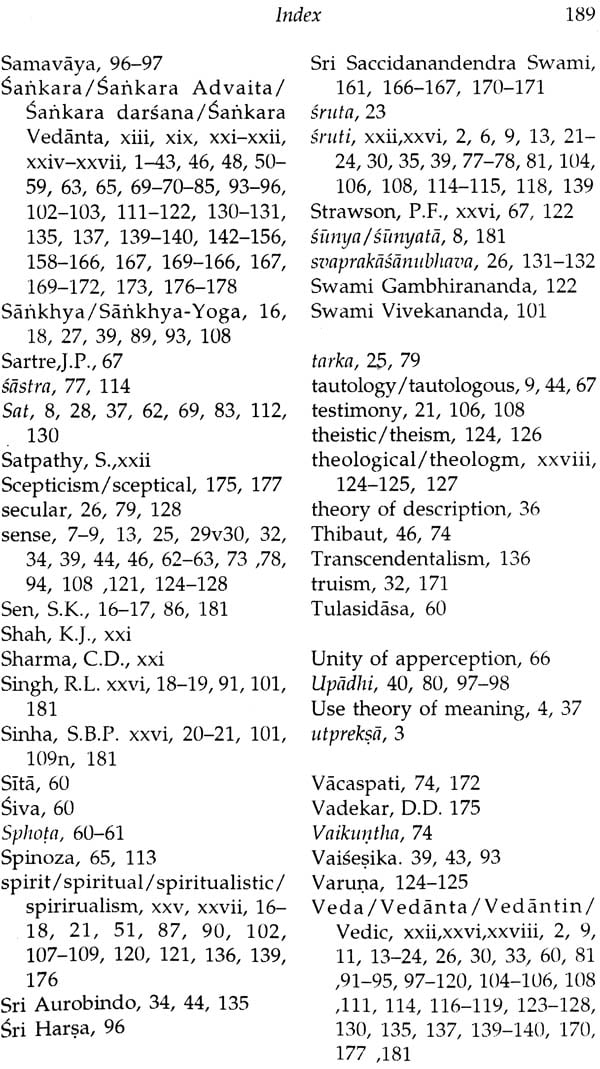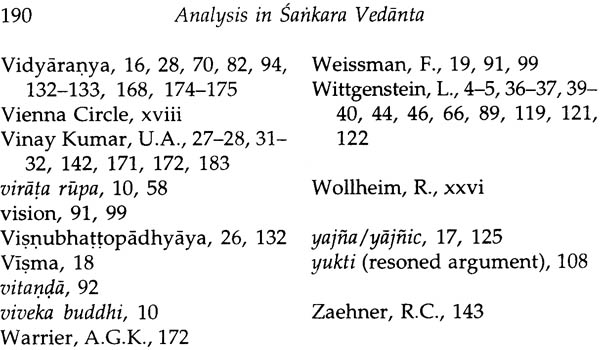
Analysis in Sankara Vedanta: The Philosophy of Ganeswar Misra
Book Specification
| Item Code: | IDJ166 |
| Author: | Bijayananda Kar |
| Publisher: | Indian Council of Philosophical Research (ICPR) |
| Language: | English |
| Edition: | 2006 |
| ISBN: | 8185636915 |
| Pages: | 190 |
| Cover: | Hardcover |
| Other Details | 8.7" X 5.7" |
| Weight | 430 gm |
Book Description
Preface
Some time past, the Indian Council of Philosophical Research made a decision to bring out a volume on the philosophy of Ganeswar Misra. Subsequently, a further decision was made by the Council to have a National Seminar on Misra and accordingly a Seminar was held at the Academic Centre of the Council at Butler Palace, Lucknow in 2001 and I was appointed as its Director. Some distinguished philosophical thinkers of the country participated and presented their observations and comments. Later on a decision was also made to get some more articles from noted researchers in the field and to include those in the proposed volume. The Council has assigned to me the task of editing the volume.
I am happy that after a long period, the task has now become complete and the volume could be released from the press. Quite in tune with the rich classical Indian philosophical tradition, Misra has been, throughout his philosophic career, engaged in reviewing the Indian point of view, specially the philosophy of Sankara Advaita from a novel perspective of analysis. It is hoped that the present volume would supply new impetus to have a fresh reading of the Indian philosophical tradition.
The Council deserves thanks from the philosophic community in bringing to the focus the insightful contributions of some of the noted recent day Indian philosophers, including that of Ganeswar Misra (along with critical comments and observations thereupon). I also thank Dr. (Mrs.) N. Kar for assisting me in preparing the Index and proof - reading.
Bijayananda Kar
Bhubaneswar
From the jacket
The book contains number of reflective essays on the philosophical thinking of (late) Professor Ganeswar Misra who was one of the pioneers in exposing as well as exploring analytical trends found on various facets of classical Indian philosophy, specially in Sankara Vedanta. The essays are prepared from various angles and are contributed by some eminent scholars of recent period from different parts of the country. All the scholars, more or less, have appreciably observed the importance of linguistic and conceptual analysis in Indian philosophical perspective, so ably emphasized in Professor Misra's writings.
It is expected that the contributions made by the learned scholars would encourage and stimulate researchers to review and reassess the classical Indian philosophy from the analytical point of view.
About the editor
Professor Bijayananda Kar is at present a Fellow of the Indian Institute of Advanced Study at Shimla. Formerly he was Professor and Head of the P.G. Dept. of special assistance in Philosophy, Utkal University, Bhubaneswar. He was UGC Emeritus Fellow (2002-04), member: ICPR (1998-2001) and Vice-Chairperson: Indian Philosophical Congress (1995-1997). He has published about 200 research papers, reviews and comments in leading philosophical sources, both in India and U.S.A. His writings have been reviewed also in prominent philosophical sources in U.S.A., U.K., France, besides India. His major books include: The Indian Theories of Error (second edition under Sophia Indological Series), Analytical Studies of the Sankhya Philosophy (second edition), Indian Philosophy: An Analytical Study, Major Trends In Orissan Philosophy, Dharma, Darsana O Manavatavada (second edition) and Value Perspectives In Indian Philosophy. On being awarded Fellowship and on being nominated, Dr. Kar visited U.K., U.S.A., Trinidad and Tobago, France, Greece, Holland, Thailand, Singapore and Bangladesh on several occasions and he delivered lectures, participated/chaired in Seminars and Conferences.
Most of the articles included in this collection have been composed by some of the well-known philosophic think- ers of India today. A few of these contributions had actually been presented and discussed at the ICPR spon- sored National Seminar held at the Academic Centre, Butler Palace, Lucknow (under my directorship) in Feb- ruary 2001 which had as its theme, the 'Philosophy of Ganeswar Misra'. While all the contributors, more or less, appreciate Misra's philosophical activities and, in this con- nection, his original look at Indian philosophy, notably Sankara Vedanta from the analytical standpoint has spe- cially been commented upon. The writers in discussing critically as well as evaluating Misra's philosophical out- look, have raised various issues from their respective philosophical perspectives while commenting on Misra's philosophic conviction, specially his rendering of Sankara Vedanta from the point of view of analysis.
In this introduction, I propose to briefly set forth the salient points referred to by the learned contributors and I will also venture to clarify the issues raised as it were from Misra's philosophic angle. I do not know whether Misra, had he been alive today, would have agreed with my clarification. But, honestly, I have the conviction that his point of view, if it will submitted to logical scrutiny, could well meet the critical comments that are raised in the articles presented in this collection. My purpose is not simply to make an attempt to defend Misra's philosophi- cal position. I am also interested in developing the original insight that Misra displayed in his study of classical In- dian philosophy, specially that of Sankara Vedanta and to trace as well as explore the implications of conceptual analysis in this framework.
First of all, let me state that in my understanding of Misra's philosophical approach he seems to be sincerely committed to treating philosophy as an analysis of con- cepts. Any genuine philosophical enterprise cannot, according to him, set analysis aside. Classical Indian phi- losophy, as viewed by him, is not different. Though there are occasional deviations, the main undercurrent in the flow of philosophical discussion is evidently analytical and critical enquiry (samiksa). Having stated this, Misra moves further to suggest that philosophy is free from dogmas and obscure thought-constructions. It is in essence clear, logical and convincingly argued. He finds confirmation of this stand in the classical Indian philosophical emphasis on pramana-vyuavastha (settlement by logical justification). So far as Sankara Advaita is concerned, Misra views it as a typical form of 'revisionary metaphysical system based upon a revision of concepts'. Though he concedes that it is metaphysical, its logical foundation, according to Misra, is not grounded on speculation, or obscure think- ing due to a picturesque imagination but on a logico-linguistic analysis of the conceptual framework as a whole. In this context, Sankara's emphasis on sabda / sruti pramana, Misra argues, need not at all be treated as a dogmatic adherence to any text or source, inclusive of the Vedas (as that would be totally unsuitable to Sankara's philosophic framework of Advaita which he wants to establish by means of reasoning and also by way of de- molishing the rival metaphysical positions based on speculative surmises., i.e. utpreksa, Sabda / sruti pramana, in Sankara Vedanta, according to Misra, is the method of logico-linguistic analysis which justifies the reality of non- dual Brahman that is beyond language, being the very foundation of it (sabdmula). That Brahman is meta-lin- guistic or trans-linguistic is never questioned in this rendering. Only it is indicated that the meta-linguistic Advaita reality (Brahman) is the outcome of logico-lin- guistic analysis. It is not the transcendental or transempirical pure Being that can be only intuited. It is the logical subject or ontic referrent which also otherwise carries valuational significance.
The first article in the volume by D.P. Chattopadhyaya, one of the most distinguished living Indian philosophers is highly thought-provoking and it duly appreciates the boldness with which Misra has presented his unorthodox radical interpretation of Sankara Vedanta. In his critical study of Misra's point of view, he has, however, expressed uneasiness concerning the philosophical analysis adopted by Misra. In what follows, I will refer to some of the issues that Chattopadhyaya has raised.
He states that Misra clearly claims his philosophical view as 'revisionary'. Here it must be pointed out that Misra has not mentioned his own philosophic stand as revisionary. However, a little later, Chattopadhyaya quotes Misra as follows: 'It (Sankara Vedanta) is a revi- sionary metaphysical system based upon a revision of concepts'. From this it is clear that Misra only interprets Sankara as a revisionary metaphysician who, according to him, proposes a revisionary metaphysical system. In other words, 'Sankara is interpreted by Misra neither as an anti-metaphysician nor as a non-metaphysician. By metaphysics (according to Misra), in the context of Sankara, is only meant a revision of concepts which is different from metaphysics of the speculative type. In Misra's own words, Sankara's philosophy 'is a kind of revisionary metaphysics which places certain key ideas at the centre and downgrades all other ideas to the pe- riphery .... This is not speculative because it condemns speculative philosophy about transempirical entities'.
Chattopadhyaya writes, 'The reader of Misra has to be first clear about his preferred logic, logic of this ordinary language or the logic of that formal language. Will Misra be prepared to espouse the use theory of meaning? Or, will he stick to the theory of meaning of the early Russell?' It seems to me that as far as Misra's stand is concerned, it is not tied to the dichotomy of the early Russellian or early and later Wittgensteinian view about linguistic philosophy. His interpretation of the concept of adhyasa from the logico-linguistic point of view does not necessar- ily become confined to either PM (Principia Mathematica) or to OL (ordinary language). In Misra's rendering of Sankara Vedanta, language plays such a role that it be- comes totally unsuccessful so far as comprehension (avagati) of reality (Brahman) is concerned. This point of incomprehensibility is reached, according to Misra, by way of logical analysis of both linguistic and cognitive forms of the discourse. And this is what constitutes the method of logico-linguistic analysis or sabda-pramana. Here logical analysis of language is neither confined to any specific language nor is it limited to any specific cultural root.
| Dedication | v | |
| Preface | ix | |
| Biographical Sketch | xi | |
| Introduction Bijayananda Kar | 1 | |
| 1. | A Radical Revisionary Interpretation of Vedanta: Ganeswar Misra Recalled D.P. Chattopadhyaya | 34 |
| 2. | On Misra on Sankara as a Conceptual Analyst Rajendra Prasad | 48 |
| 3. | Language, Meaning and Reality S.L. Pandey | 60 |
| 4. | Advaita Brahman and Linguistic Analysis G.C. Nayak | 71 |
| 5. | A Brief Study of Professor G. Misra's Paper on 'Metaphysical Models and Conflicting Cultural Patterns' Sanat Kumar Sen | 86 |
| 6. | Linguistic Analysis and Ontology R.L. Singh | 91 |
| 7. | Professor G. Misra's Approach to Sabda-jnana-Some Brief Critical Observations S.B.P. Sinha | 101 |
| 8. | Ganeswar Misra on the Availability of Linguistic Analysis in the Philosophy of Sankara R.C. Pradhan | 111 |
| 9. | Vedic Dharma: G. Misra's Presentation D.M. Praharaj | 123 |
| 10. | A Note on Ganeswar Misra's Meta-linguistic Advaita Jagannatha Dash | 129 |
| 11. | Professor G. Misra as a Philosopher Manoj Kumar | 134 |
| 12. | Adhyasa (Superimposition) Revisited U.A. Vinay Kumar | 142 |
| Philosophical Writings of Ganeswar Misra | 173 | |
| Contributors to the Volume | 179 | |
| Index | 184 |
